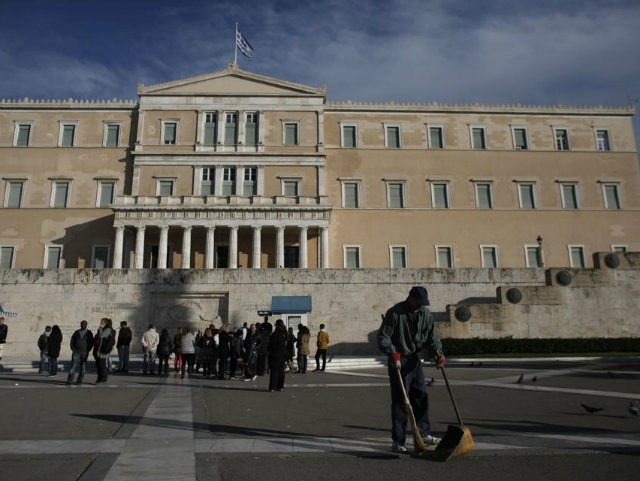This morning’s key headlines from GenerationalDynamics.com
- Europe prepares for Greece’s possible exit from eurozone
- Paris France’s Charlie Hebdo attacks provoke anti-Pegida protests in Germany
Europe prepares for Greece’s possible exit from eurozone

Syriza leader Alexis Tsipras dances with party official Rena Dourou at pre-election rally last month (EPA)
It’s far from certain, but the impending Greek crisis rerun during the next month poses a real threat that Greece might have to leave the eurozone and start printing drachmas again, with the result that bankers and politicians are drawing up contingency plans in case it happens.
The radical far left Syriza party is maintaining a “stable and sharp edge in the polls,” according to one analyst, for the January 25 election, meaning that Syriza leader Alexis Tsipras is the most likely person to be Greece’s next Prime Minister. Tsipras has promised that if he wins, then Greece will renege on the austerity commitments it made when it received a 240 billion euro bailout that has already been paid. In particular, he took a swipe at Germany when he promised that the country will “write down most of the nominal value of debt… That’s what was done for Germany in 1953, it should be done for Greece in 2015.”
Greece is in serious economic trouble. It has to come up with 4.6 billion euros in bond maturities in March, and 31 billion euros total by the end of 2015. On the income side, tax revenues have been 40-50% below expectations. In February, Greece has to pay creditors 2 billion euros, and must pay another 4.5 billion euros to International Monetary Fund (IMF) this year.
So Greece needs another bailout, and both sides are playing a game of chicken. Germany says Greece won’t get the new bailout unless they stick to the existing austerity commitments. Tsipras says that they’re reneging on the commitments, and that Europe will have to provide the bailout anyway.
Most analysts believe that “Grexit”, the Greek eurozone exit, will be avoided because some compromise will be reached. But in the 1950s, the game of chicken was played with two cars racing at each other until one car or the other turned away, and we know that sometimes neither car turned away, with explosive results. Greek Reporter and Nasdaq and Greek Reporter
Paris’s Charlie Hebdo attacks provoke anti-Pegida protests in Germany
Germany’s anti-radical Islam Pegida movement fielded 25,000 protesters in Dresden on Monday, the largest number ever. The Pegida movement (“Patriotische Europäer gegen die Islamisierung des Abendlandes,” or “Patriotic Europeans Against the Islamization of the West”) protests have been growing in size since Pegida was launched in October.
There has also been a growing opposition, and 100,000 Germans have attended anti-Pegida counter-demonstrations. The growth of the anti-Pegida movement was spurred by the Charlie Hebdo attack in Paris last week by Islamic jihadists. As I’ve been writing, the number of Islamic terror attacks is expected to increase as collateral damage to the growing Muslim versus Muslim wars in the Mideast, South Asia and North Africa. (“12-Jan-15 World View — Is Islam at war with the West?”)
According to some historians, Dresden is the perfect city for the growth of the Pegida movement, because of its role in World War II. In February 1945, American and British bombers dropped 4,000 tons of explosives on Dresden, destroying the city. Twenty-five thousand people were killed. The anniversary is still marked every year with protest marches through Dresden’s rebuilt center. The history shapes the worldview of many Pegida supporters. According to Werner Patzelt of Dresden University:
The argument runs basically like this: Dresden has been destroyed by Americans and English bombers. Americans have never stopped bombing around the world. Now they bomb in the Near East [Middle East]. They destroy states there. As a result, we have so many refugees.
Patzelt adds that Russian flags seen during Pegida marches indicate the desire among some for a counterweight to American power. VOA and Globe and Mail and Bloomberg
KEYS: Generational Dynamics, Greece, Syriza, Alexis Tspiras, Rena Dourou, International Monetary Fund, IMF, Paris, France, Charlie Hebdo, Germany, Dresden, PEGIDA, Werner Patzelt, Patriotische Europäer gegen die Islamisierung des Abendlandes, Patriotic Europeans Against the Islamization of the West
Permanent web link to this article
Receive daily World View columns by e-mail

COMMENTS
Please let us know if you're having issues with commenting.